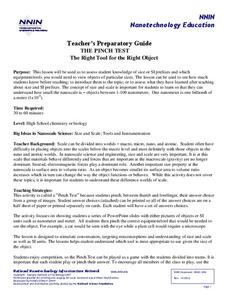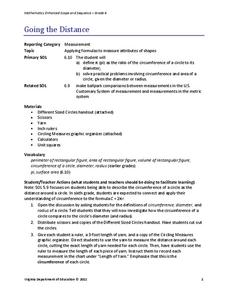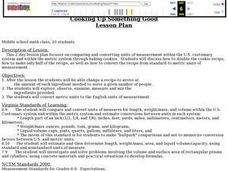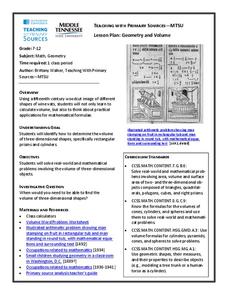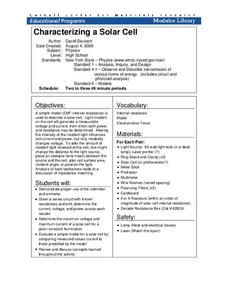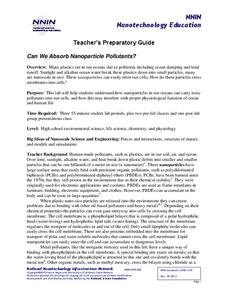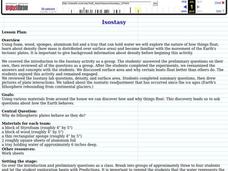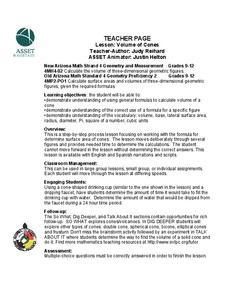National Nanotechnology Infrastructure Network
The Pinch Test
Test your pupils' understanding of the scale from macro to atomic. While displaying images of different materials, learners identify what they would need to make that material visible. Their choices range from the human eye to an...
Curated OER
Sinking Races
Students build plankton models and compete to see which sinks most slowly. They write, or orally present ,the adaptations they incorporated to slow the sinking rate of their organisms. Race results can be grounds for some prizes!
Curated OER
Biomes and Plant Growth
Seventh graders design four biomes models and plant three types of seeds in them to observe growth. In groups for each type of biome, they predict the seeds' growth in each of the settings. Students follow the conditions on a biome chart...
Virginia Department of Education
Going the Distance
Estimate the value of one of the most famous irrational numbers. The hands-on lesson plan instructs classmates to measure the circumference and diameters of circles using yarn. The ratio of these quantities defines pi.
Curated OER
Cooking Up Something Good
Students compare and convert units of measurement within the United States customary system and within the metric system by baking cookies. Students discuss how to double the cookie recipe, how to make only half of the recipe, and how to...
Curated OER
Around the Clock
Middle schoolers discover the relationship between the circumference of a circle and its diameter. They find the length of an arc of a circle.Students use estimation strategies in real-world applications to predict results (i.e.,...
Curated OER
Measurement: 2D and 3D
Students solve volume problems. In this geometry lesson, the class watches a video about clean water (link provided) and individuals compare the volume of different prisms, including an actual drinking glass. Extension activities include...
Virginia Department of Education
Geometry and Volume
The history of math is fascinating! Utilize a woodcut primary source image from 1492 and posters from the 1930s to help geometers apply their volume-calculation skills to real-life questions.
University of Nottingham
Drawing to Scale: A Garden
See how design and geometry go hand in hand. The activity asks learners to use geometry to design a backyard garden given dimensions of each feature. Scholars work with ratios and scale to develop an accurate scale drawing that includes...
Mathematics Assessment Project
Designing a 3d Product in 2d: a Sports Bag
Sew up pupil interest with an engaging, hands-on instructional activity. Learners first design a sports bag given constraints on the dimensions of fabric. They then evaluate provided sample responses to identify strengths and weaknesses...
Mathematics Assessment Project
Sampling and Estimating: Counting Trees
Your task today: count all the trees on a tree farm. To complete the assignment, learners first estimate the number of trees on a tree farm using random sampling. To improve their own response they then evaluate provided responses to the...
Mathematics Assessment Project
Estimating Volume: The Money Munchers
Don't stuff money under your mattress. To find out why learners first complete a task determining how $24,000 in cash would affect the height of a mattress and whether this same amount would fit into a suitcase of given dimensions. They...
Mathematics Assessment Project
Applying Angle Theorems
Polygon ... an empty bird cage? After finding the angles of a polygon, young mathematicians use the provided methods to solve the problem in multiple ways.
Teach Engineering
The Amazing Aerogel
Introducing ... the aerogel. The first of a two-installment series teaches young engineers about the properties and uses of aerogels. A PowerPoint presentation provides information about this unique material to help solidify the concept.
Curated OER
Scientific Method Experiment: Factors Affecting How Ice Melts
Students demonstrate the scientific method by conducting an ice cube melting experiment. They make predictions and observations, and conclude what factors make ice melt more slowly or quickly than normal.
Virginia Department of Education
Exponents and Radicals
What is that fraction doing as an exponent? Fun math games prompt learners to practice evaluating radical expressions and expressions containing rational exponents, both in groups and individually.
LABScI
Freezing Point Depression: Why Don’t Oceans Freeze?
Can you go ice fishing in the ocean? Learners examine the freezing point of different saltwater solutions. Each solution has a different concentration of salt. By comparing the freezing points graphically, they make conclusions about...
Cornell University
Characterizing a Solar Cell
Young classes are sure to get a charge out of this instructional activity! Learners experiment with circuits of a solar cell. They practice determining current, voltage, and power for the circuit and maximize the voltage and current of...
National Nanotechnology Infrastructure Network
Can We Absorb Nanoparticle Pollutants?
Just because we can't see it doesn't mean it isn't there! A growing concern for environmental scientists is toxic nanoparticles in our air and water. Young scholars conduct an experiment to demonstrate how these particles can cross our...
Curated OER
Which container holds a larger amount of popcorn?
What does popcorn have to do with math? Seventh grade mathematicians are provided an opportunity to develop a conceptual understanding of the formula for volume and to use it as a tool to solve problems. The lesson begins with a...
Shodor Education Foundation
Volume of Prisms
Explore the concept of volume of prisms using an applet to perform the calculations. The link to the interactive applet is embedded into the lesson plan as well as a link to associated data sheets. Get your math class to the computer lab...
Curated OER
Great Lakes Food Web
Students identify species and components of a Great Lakes food web. Using note cards, they place themselves in the correct order of the food chain based on the species present. They discuss what they believe happens to various species...
Curated OER
Poetry in Motion
Sixth graders answer questions about "From a Railway Carriage." They discuss different poetical forms. They work together to write a poem about travel.
Curated OER
Volume of Cones
Students identify the volume of cones and pyramids. In this geometry lesson, students derive the formula for cones and pyramids. They calculate the volume of cones and other three dimensional shapes.
Other popular searches
- Surface Area and Volume
- Surface Area and Net
- Cylinder Surface Area
- Surface Area of Prisms
- Surface Area Volume
- Surface Area of Cylinders
- Finding Surface Area
- Surface Area Cone
- Surface Area Volume Cylinder
- Surface Area Lesson
- Cylinder Surface Area Nets
- Lateral Surface Area


